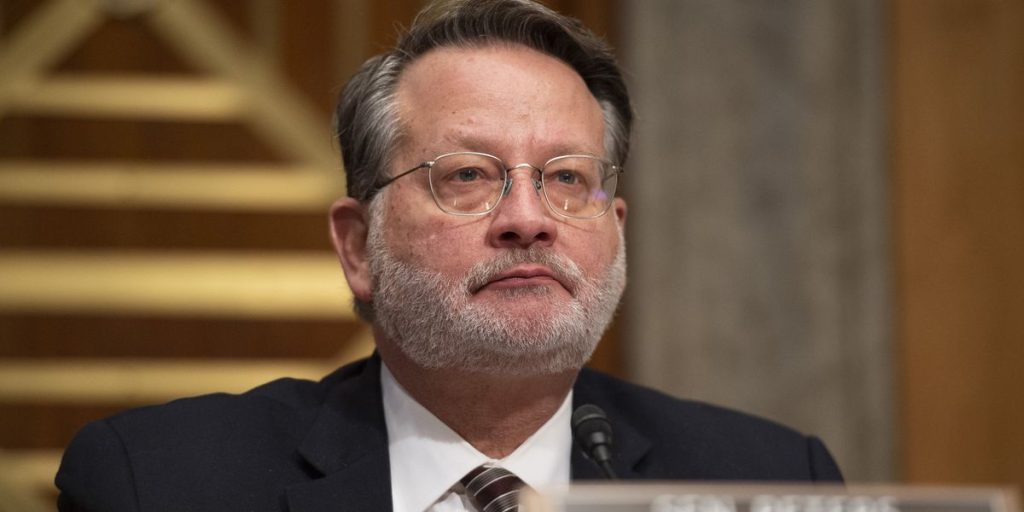Democratic Senator Gary Peters of Michigan recently declared that he will not seek re-election in 2026. Peters, who began his political journey in the House of Representatives in 2008, moved to the Senate in 2014. After two terms, he expressed a desire to “go back to private life.”
This marks a significant transition as Peters steps away from a long political career. Some critics argue that his tenure was marked by neglecting issues like illegal immigration and the decline of Michigan’s auto industry, suggesting that the state might benefit from a change in leadership.
With Peters’ departure, prominent political figures, including former Democratic presidential candidate Pete Buttigieg, have shown interest in the soon-to-be-vacant Senate seat. Michigan, known for its diverse voter base, presents an opportunity for Republicans to potentially reclaim or strengthen their Senate presence.
Peters reflected on his career, stating, “I always thought there would be a time that I would step aside and pass the reins for the next generation.” He emphasized that he never intended to make a lifelong career out of serving in Congress.
Peters’ initial entry into the House in 2008 was seen as a temporary commitment, with his sights set on eventually returning to private endeavors. His decision not to run again provides Republicans with a strategic opening in the Senate.
Republican Senator Tim Scott of South Carolina, who also serves as the chairman of the National Republican Senatorial Committee, commented on Peters’ decision. Scott remarked, “Gary Peters is reading the room,” and pointed to what he views as Peters’ shortcomings during his time in office.
Scott further criticized Peters, saying, “After spending years ignoring illegal immigration and destroying his state’s auto industry, Michigan is better off without him.” This sentiment captures a broader Republican critique of Peters’ legacy, emphasizing the challenges that have faced Michigan under his watch. Scott highlighted the GOP’s commitment to offering a candidate who aligns with former President Trump’s vision for economic prosperity and national security.
The upcoming Senate race in Michigan will undoubtedly be a focal point for both parties, with Republicans eager to seize the opportunity presented by Peters’ exit. The political landscape in Michigan, with its blend of urban and rural voters, will play a crucial role in shaping the outcome. As the election approaches, both parties will likely intensify their efforts to connect with Michiganders and address their concerns.
Peters’ decision not to seek re-election has stirred conversations about the future direction of Michigan’s representation in the Senate. Potential candidates from both sides of the aisle will need to articulate clear visions to win over the state’s electorate. Republicans are particularly optimistic about their chances, aiming to capitalize on what they perceive as Democratic missteps under Peters’ leadership.
The transition period offers an opportunity for fresh voices to emerge and potentially reshape Michigan’s political landscape. As Democrats and Republicans gear up for what promises to be a highly contested race, the focus will remain on key issues affecting Michigan residents. The state’s economic challenges and the broader national debate on immigration are expected to be central themes in the upcoming election.
With the political stakes high, the race to fill Peters’ seat will likely attract significant attention and resources from both parties. Each side will work to galvanize their base and appeal to undecided voters across Michigan. As potential candidates step forward, the electorate will be tasked with evaluating who best represents their interests and values.
The anticipation surrounding this Senate race underscores the dynamic nature of American politics, where shifts in leadership can lead to new opportunities and challenges. For Republicans, the goal is clear: to secure a candidate who can champion conservative values and effectively challenge Democratic policies.
The upcoming election will serve as a litmus test for the political climate in Michigan and potentially influence the national balance of power in the Senate.
As the campaign unfolds, Michigan voters will be watching closely to see which candidates emerge and how they address the pressing issues facing the state. The outcome will not only impact Michigan but could also have broader implications for the political trajectory of the nation. Both parties recognize the significance of this race and will undoubtedly invest considerable effort in vying for victory.
In the meantime, Michigan’s political scene remains lively, with potential candidates weighing their options and preparing for what promises to be a competitive and closely watched election. The departure of a seasoned politician like Peters opens the door for new leadership, providing an opportunity for change and renewal in Michigan’s representation on the national stage.



1 Comment
Aww, Peters did not get a Biden pardon and is upset!